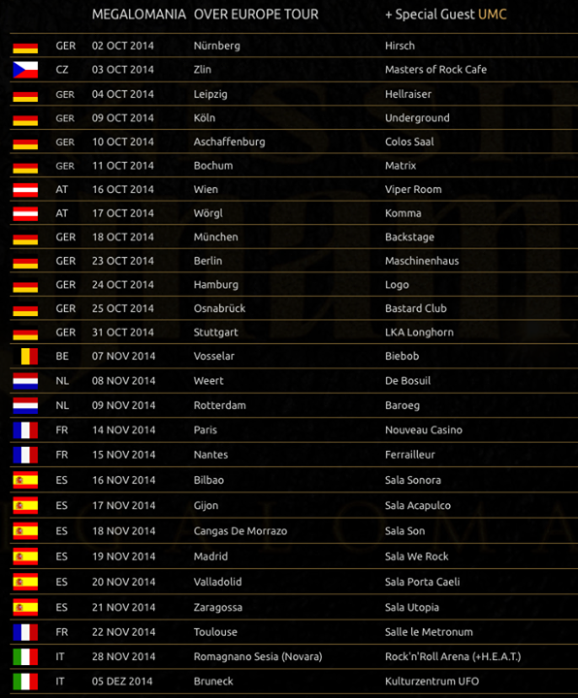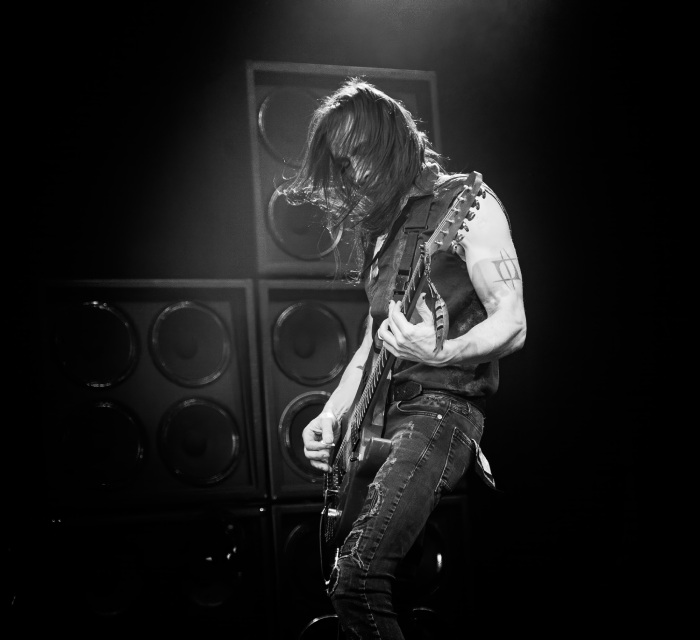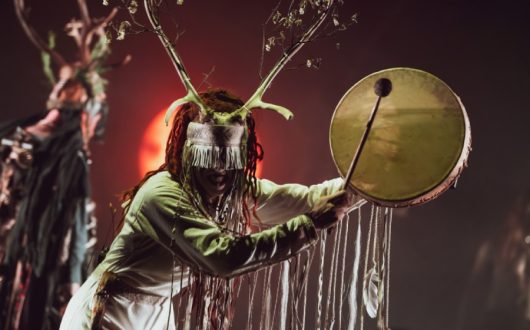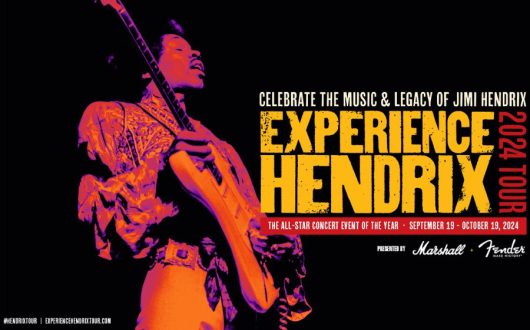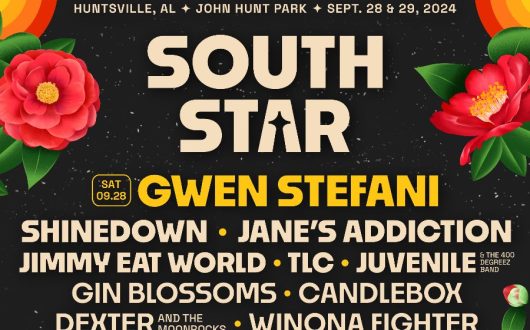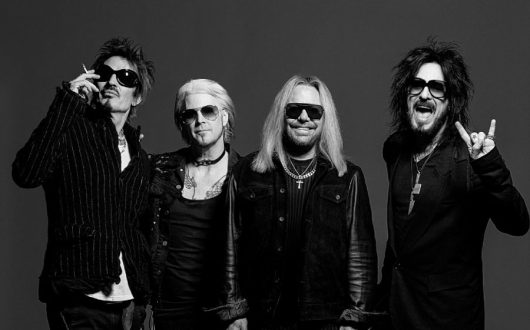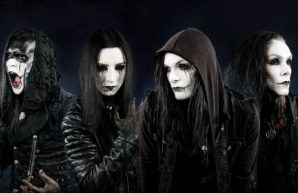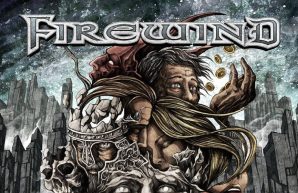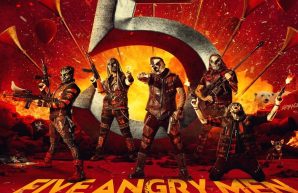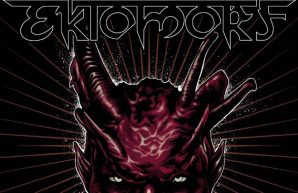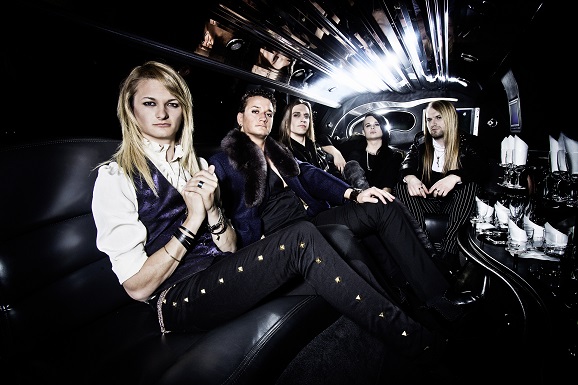
Interview by Adrian Hextall (Journalist/Writer/Contributor) Myglobalmind Webzine
Sitting in the Imperial Hotel, Russell Square, London, Kissin’ Dynamte’s lead singer and guitarist Hannes and Jim have spent most of the day in promo meetings with various media agencies and publications. By the time we get around to our agreed slot at 7:30pm I wonder if we will manage to get them engaged to cover a lot of (what I assume will be) the same material they’ve been talking about all day. Thankfully we find them in fine form, Jim is looking and sounding energised and Hannes is welded to his phone speaking (although more listening as that’s what guys usually have to do…) to his girlfriend. As he finishes his call their dinner is delivered to our table and we begin to chat in between mouthfuls of steak and burger, the staple diet for any aspiring rock band.
As we place the voice recorder on the table negotiating beer, ketchup and other condiments I ask Jim about the bands desire to bring back stadium rock, which I think they’ve definitely done with the latest album. Given that the stadium rock sound has definitely disappeared over the last few years, it’s got to come back at some point. Can Kissin’ Dynamite be the flag bearers for that one?
JIM: Yeah, nowadays the problem is that there are so many big old bands that kind of makes it hard for young bands to get that big, full stadium rock. We see our chance in that the big ones now start to stop making music, and then comes the chance of bands like we are, or bigger bands got the chance to get that big. The festivals, they won’t get smaller. They stay at least the same size and they need their headliners. Where are all the headliners if there’s no more Black Sabbath, no more Iron Maiden, no more Aerosmith, to name all these bands who are the stadium bands for me personally.
So there’s a chance for a new generation of bands to get that big light. There are some bands who already made it, like Rammstein, for example. This is the perfect example for me, for a band which is not based in the 80’s and still got big and played stadium. But they’re really that special that it’s just a sure thing, because there’s no more bands beside Rammstein, except really small bands, doing this electronic, industrial, metal stuff – whatever you want to call it. So I’m really looking forward, on the one side, to the chance, but on the other hand, I’m a little bit feared because those guys are my heroes and I don’t want to stop them from making music.
You still enjoy going to see them?
JIM: Absolutely, but just think about all the young guys out there who don’t have that much money and thinking about the pay. Do I listen to Iron Maiden this month or do I listen to four concerts of small bands. He will go to Iron Maiden definitely. That’s a problem. So I’m kind of looking forward to it.
It depends as well though, I suppose, as to how much cash you have available. Because you guys, at the moment, can’t quite charge maybe 60 Euros a ticket.
JIM: No. But we did in Japan actually. But it was still so loud. We were going there and the promoter said, “The ticket is 50 Euros,” and we go like, “Are you crazy?” But it was still sold out. We were really happy about that. But it’s not about the money. I’d rather play cheap tickets and big crowd. It would be much more better. It’s all about the fun.
As we switch speakers to allow Jim to tuck into his burger, we turn to Hannes to talk about the creation of the band and the path that has led them here since they got together as school friends back in 2007.
HANNES: The ground core of the band actually are three people – me and my brother (Ande Braun) and the bass player (Steffen Haile). We started even in 2001 when I was nine, and that was really a school band. We were doing cover rock from the beginning. Really, we were not good at our instruments and stuff, but that was the first step. Two or three years later, actually we started writing our own songs and played them live to make people listen to our own shit. Of course they wanted to hear the cover songs and they celebrated to those tracks, but we simply wanted forced people to listen to our stuff and– because it’s always difficult for a young band that they always do an EP, two or three tracks on a CD and want to sell it in the streets, but nobody knows it. Why should anybody buy it? Why should anybody listen to it? Why should anybody download it, even for free? If they don’t know it. You have to force people to listen to your music.
An easy way, presumably, to get them to listen to you is to play songs they know, so you’re forced down that route to covers to begin with and then introduce your material?
HANNES: Sure. And that worked somehow because at the age of 15 and 16, we were still more a cover rock band than an original band. But a record label noticed us, which was EMI – one of the big ones – and so we played a showcase in Berlin. Even then we played two or three songs which were cover rock, no original material. They liked it so– they were in the hotel room the next morning and wanted to sign us. So it’s always a lot of luck as well. It’s not just that a band has to be good at their instruments or has to be young. Doesn’t mean you have to be young. It just means you have to be at the right time, at the right place in this industry.
Did you put Steel of Swabia out on EMI then?
HANNES: Yeah. And even Addicted to Metal. The second one was also brought out by EMI. And then we had the problem of not feeling 100% pushed by them, because between Rolling Stones and Robbie Williams there’s no big place for Kissin’ Dynamite. But then we had the lucky chance to go to AFM Records. They’re a quite small metal label and they totally focused on us. That’s where we made the biggest step of our career so far from Addicted to Money, Sex, Power with a real cool label which is 100% behind us and really wanted to achieve something, not just saying, “Oh yeah, they’re quite cool. Let’s give them a little bit of money and let’s see what happens.” No, they really pushed us to step forward like never before. That’s where it was clear the decision that we will stay at AFM and even to a bigger step from Money, Sex, Power to Megalomania. Addicted to Metal was 94 or 96 in the chart position. Money, Sex, Power was 50, and now Megalomania got 17. And this is fucking awesome, I mean–
And that’s the first week of release, as well. That’s pretty good.
JIM: No really, we’re so happy with that.
Can I just jump back to Addicted to Metal, because this is actually the album that got me into listening to you guys at the beginning. And you’ve got Udo playing on with you, on that album, haven’t you? How did that come about? Because he must have helped you in terms of promoting that album initially?
JIM: He met us at a festival in Germany, I guess it was Bang Your Head, was it?
HANNES: Yeah. Because he just played there as well, the same day, like a few hours later for sure. He was one of the headliners. But he was there earlier and just noticed us from backstage, walked onstage, and watched our show from the side of the stage. After this, he told us that he liked us and he liked the energy and how we performed and our songs and stuff. We had a long talk with him. What really was crazy is that he drank, I guess, two bottles of wine during our conversation which was two or three hours. He’s quite a good drinker as well, but totally conscious. We were like, “Can he remember when we see him the next time?” And he could, like he was, “Kissin’ Dynamite, nice to see you again.” Then the idea came up, “Hey, we’re going to do a new record.Would you like to do a feature on our album?” We were just asking him. In our heads, the answer was no. We expected no because you always get a no in that business. He was kind enough to say yes, and we did it and after this we also went on tour with him – at least for part of the tour. That was also a big success. His fans liked us, so a big friendship actually started with all that. Now, still, we are in contact with him. We chat on WhatsApp and Skype and whatever, so yeah.
JIM: And he always wanted to know, “What’s the plan now, what’s new with Kissin’ Dynamite?” if he can help actually, and that’s quite cool to have such a person in business that actually want to help you. This is getting even – how do you say – even better to the fact that most of the bands nowadays work against each other, and this is the really sad part. We know several bands who actually called a promoter of a festival and said, “We won’t play before these guys.” So what the fuck should that be? That’s a really sad thing. We first discovered being on a gig with Blackrain and Crashdiet, for example, we felt like a family to put something together and we tried to– they’re a set of bands from France, from Sweden, and from Germany who tried to put something together and tried to push each other. This is really important for us because it’s not like in football a thing that– where you need to play against each other, because there’s no chance to win in a band situation if that exists.
You mentioned Crashdiet as well then. Is it that sort of artist in the similar vein, are they the guys that you see yourselves not up against, but playing with, similar musical styles, team mates ….?
Yeah, kind of. Absolutely. There are several bands like that we know and still are close friends with, and we really try to push each other on every level. We promote the causes and say, “Hey, we still need a supporter.” You say, “Yeah, I know some,” and we try to always connect each other. As I said, that’s the sad part because to every friend made, there’s even the same number of friends who work against each other with no particular reason. That’s the shitty part about it. It’s like bands who you thought they were your hero, so you were listening to their like ten or even more years, and they come to you and say, “You won’t play after us.”
At the end of the day, the fans just want to see all the bands play together. That’s all that matters.
HANNES: So, this is the sad story behind the business.
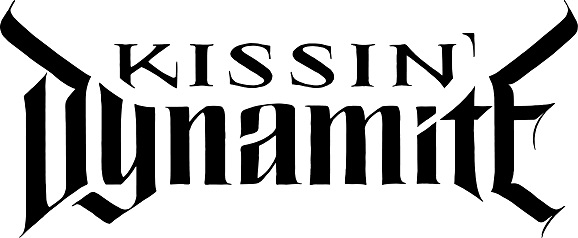
Now for a German band, you don’t sound at all like a German band. You guys must feel in terms of the current music scene, you’ve got more contemporaries in Norway, Sweden, and Finland than necessarily in your home country. The sounds you’ve got, that stadium rock sound, aside from say Rammstein, you’ve got some bits on that as well, and you’ve got a sound much more in keeping with Crashdiet, H.E.A.T even, that stadium rock sound. Santa Cruz is another that springs to mind. You’re slightly different, because there’s a heavier element to you guys which is probably a German piece as well, and there are some industrial elements in the music as well. But you’re not a typical German band, are you, at all?
HANNES: It’s just that we want to separate ourselves from all the other bands that are happening in Sweden and Scandinavia itself or the US as well because we are not fucking born in Los Angeles, California and we’re not born in 1970, so to speak, growing up in the 80’s. It is a young band. We are 22, 23. We are happening in Germany and we’re happening in 2014. Of course we’ve got our roots in the 80’s and we don’t want to deny them and they are good because we know it from our parents. They listened to Guns N’ Roses, Motely Crue, AC/DC, and and whatever. We did so too, passively, and we liked it. This is part of our identity. But there is another part of our identity which is modern music because we’re a modern band. We go to dance clubs sometimes.
I’m glad you said that. Some of the electronic work you’re doing on the latest album, even on DNA for example, even that sounds like it’s coming out of a dance club and is not just a rock track at all.
HANNES: It also fascinates us. And the thing is, I was in Japan in a dance club after the show and I was like, “Oh my God. This is not too different from rock music,” because when it comes to the effect that it has on people, it’s pretty much the same. It makes them freak out. I was like, “Oh my God. It must be possible to combine it somehow. It must be possible to mix it up.” That’s why we got back to Germany with a huge amount of inspiration because of all the experience we had in Japan. We just tried it out, or I just tried it out. I did a five tracks reproduction demo tapes and I handed over to the guys and they were like, “Fuck! That’s cool. It sounds like Kissin’ Dynamite’s in a totally refreshing new way and this is it”. And that sets us apart from all the other bands, those you mentioned like Crashdiet, H.E.A.T…
Which are much more straighter edged–
We were a copy of a copy of a copy. We liked those bands personally. We are friends to them and they are good musicians, no doubt about that. But I don’t think that they will get far always being a copy, like we were too. Every band should ask themselves what they really are and what they are really heading for. And if you look at the music history, it has always been innovation that was the key to build up something really individual, something really mind-blowing that stays for decades. A copy will never reach that level. It’s quite simple.
I couldn’t agree more. If you look at things on the new album like VIP in Hell, for example, you’ve got RAP and heavy rock as well, other tracks have the industrial elements that I would say stand out like Rammstein at times as well…
HANNES: Because we get inspiration from everywhere. It doesn’t mean that you have restricted musical taste. There is a limit within one genre. Music is good when it’s played well I would say. When it comes to VIP in Hell and the rap part, I’m not a fan of hip hop. I don’t listen to hip hop all day, but some tunes I like. Maybe every metal fan knows that feeling, if they are honest to themselves. You can be the biggest metal fan in the world; I’m sure you will have at least one track of another genre that you like. This must be the evidence that it can’t be just one genre that you like and that you want to play. This is not the way of being original.
It’s how you sum it up. If it’s a good song, it’s a good song. It doesn’t matter what the genre is, does it?
HANNES: A good song always wins.
You’ve got as the lead single, DNA. You’ve done a video for that as well, set out on what looks like the edge of a big reservoir or something. But clearly, a super choice for the lead single and the video, as well. What’s the response to the video been like?
JIM: The response to the whole album actually has been fantastic. At the beginning, we were a little bit scared of changing or developing into this unique style, because we wanted to keep for sure our fans and friends from before. I mean, everybody knows bands who will change that much, they will say, “I liked them until that album, and from that album I can’t identify anymore with the band.” That was our biggest fear, but at the end, everyone was happy. So, to come back to your question, it was that we wanted to have not an extremely different song for having as a first single. I think DNA is the perfect smooth intro to get to existing friends happy with us. Because it’s still got these 80’s tunes. Without a keyboard, it could be absolutely a song and a track of any other rock band. With the keyboard, it’s something different. It all fits perfectly together. That was a real important thing for us, not just for they video, but also for the style and for the cover of that album. So we said, “We want to have something completely different, it’s time for change.” A new design of being ourselves, and now it’s time to change.
HANNES: The output was ours. Also, the look, I wasn’t given a look or something. It was our idea, we had that feel for something big when we came back from Japan. And that was really a truth that we’d never seen before, you could say. And we just wanted to follow this truth and that meant that we are fed up with this stupid cliche of, “Let’s get freaky” rock. What we did on the first record, on our debut, it was a time and we don’t regret anything, I wouldn’t say at this point, but we have grown up and you could hear that musically, and you should also see this when it comes to our looks. That’s why we said, “Come on, it’s misleading. We put our hair up still.” It’s misleading. People don’t understand us.
JIM: And that you’re getting lazy, because I mean, one hour to get your hair up before every show, it’s hard.
HANNES: It was really a whole conceptual thing that we created on our own…we didn’t want to leave question marks in people’s faces. We wanted to push out the message with full force, with the– you don’t have to doubt anything. We just wanted to push out the authentic message of Kissin’ Dynamite.
Tell me a little bit about Golden Cage. I’ve not heard this one, because when we did the album review, I heard that this is a bonus track, I believe. Tell us a little bit about that. What are they getting that’s a little bit extra with that?
HANNES: Well, this is a bonus track. You can get this at least on the DigiPack version of Megalomania. Not the jewel case, but the better version, so to speak. And also, in the box set, which is the deluxe version. Golden Cage: when you consider a title– you can easily explain it to yourself. It’s also a subject under the headline of Megalomania. You’re sitting in a golden cage; you make yourself bigger than you are. Well, you get the idea. Musically, it’s quite interesting because I was like, “Okay, we already have ten tracks. They sound pretty diverse, but I don’t want to put out one more song that sounds like anything else on the record.” What the general aim was, was to put a lot of inspiration into our Megalomania thing. That also came along with different touches, such as the aria for Golden Cage. I can’t really tell why I chose this for the song title – Golden Cage – but it just fit good. That song has this attention rising from the beginning on, and it’s getting stronger and stronger and stronger, and it ends with this scream, “I’m sitting here in a golden cage,” and you can feel the desperation; the feeling of being desperate. I just liked the idea to have something totally different on the record, with that style. Even for Japan, we have made another bonus track. I don’t know if you know that. It’s a really fast one. It’s called In The Eye Of The Shit Storm [chuckles].
Great name for a track; brilliant.
JIM: It’s my favorite song of all the tracks. Too bad it’s just a Japanese bonus track.
Okay, so final thought from me, you’re touring everywhere except here in the UK?
HANNES: Yeah. And it’s a shame. It’s not that we hate people in the U.K., it’s just really difficult for a– well, we’re not a small band anymore; not that small, but we’re still small. It really difficult to get an opportunity to play in a new country. It’s not that we don’t to. We’d fucking love to tour U.K. The thing is, you got two options actually. You either have great bands that take you as a support with them, and it must be a great band to play in front of a lot of people. It’s really expensive. Touring with a great band costs almost the same as it does to be headliners. You need your own light guy, you need your own sound guy.
JIM: The thing is actually the cost with a support band. Also with the second option, which is you go there by your total own risk, and you play headlining shows in really small clubs, and you don’t have a clue if it’s going to be successful or not. You have to pay the flights, you have to pay anything. You pay your own private money. You can end up with your face down in the dirt, and this is nothing– if you do it and end up with your face down in the dirt, it’s shitty for us. It’s shitty for the image of the band in that new country that you wanted to play in, because it means that band wasn’t successful, why should any promoter bring them back to the country in the future? So every young band has to wait actually, for a promoter that is brave enough to put them there, and to invest something; to make them big there.
Or the third opportunity: a big festival.
Yes, but a big festival is also tough. I mean, we were fucking lucky in the Czech Republic where we wil headline but it was down to the work by our team that helped there. But maybe one day – maybe next year – the promoter comes to us and says, “Hey, I like you guys. Maybe you want to play in the afternoon,” and there will be a few thousand people watching us and it grows from there.
At this point we wrap up and I leave the guys to their final interview of the day
Well, I wish you the best of luck, guys. I really appreciate it.
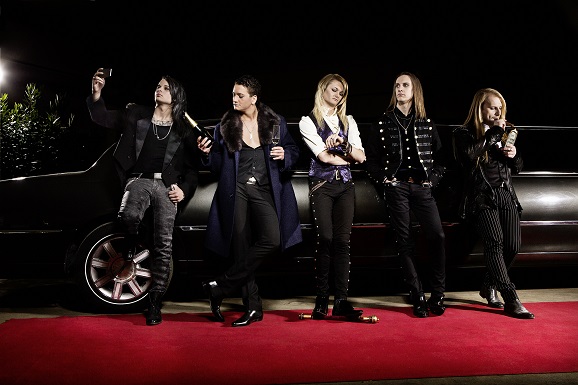
Kissin’ Dynamite play live on the following dates over the next few months:
